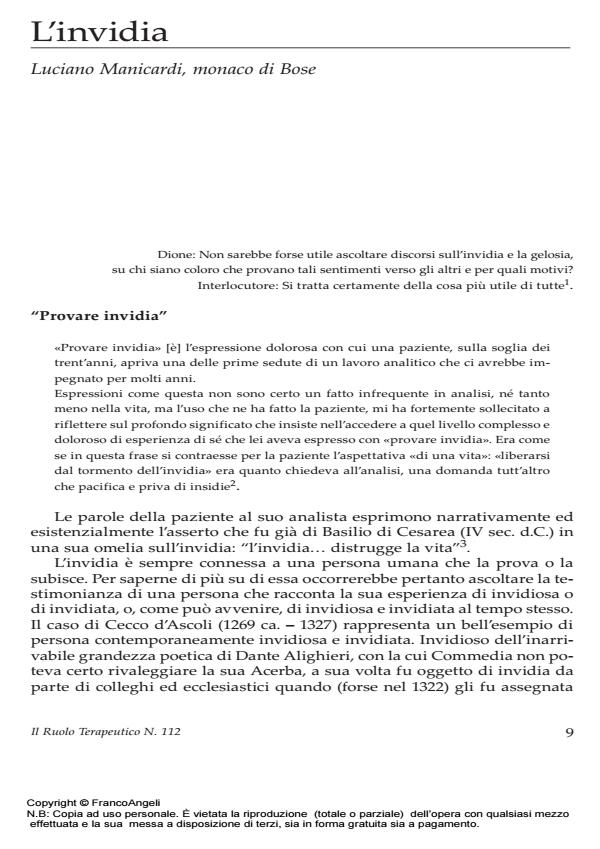L’invidia
Journal title RUOLO TERAPEUTICO (il)
Author/s Luciano Manicardi
Publishing Year 2009 Issue 2009/112 Language Italian
Pages 25 P. 9-33 File size 405 KB
DOI 10.3280/RT2009-112003
DOI is like a bar code for intellectual property: to have more infomation
click here
Below, you can see the article first page
If you want to buy this article in PDF format, you can do it, following the instructions to buy download credits

FrancoAngeli is member of Publishers International Linking Association, Inc (PILA), a not-for-profit association which run the CrossRef service enabling links to and from online scholarly content.
Envy - The author with extraordinary ability renders a delicate subject like envy accessible, defining a human experience as old as humankind. Traces are found in the oldest myths. The history of man is described in the Bible as a story of invidious personages. And like all that is human it is a fleeting and variegated reality. Since it cannot be declared, we can only look again at the traces that it left in literature, art and myths. Envy has to do with the experience of seeing. Etymologically it means looking sideways. The envious glance presents an aspect of illusion, both when it is directed at others and when it is directed at the self. Envy has to do with the experience of saying. It is not confessable. And slander is a way of destroying the envied one. It presents a constant characteristic: suffering, which pervades all of the relationships of the envious one who suffers for the happiness of others and takes malignant pleasure in others’ suffering. This prevents him from loving and being loved and conducts him inexorably to self impoverishment. Envy springs from a sense of lack whether real or perceived and from intolerance for ones own Copyright © FrancoAngeli N.B: Copia ad uso personale. È vietata la riproduzione (totale o parziale) dell’opera con qualsiasi mezzo effettuata e la sua messa a disposizione di terzi, sia in forma gratuita sia a pagamento. 30 Il Ruolo Terapeutico N. 112 limits. However, within envy positive factors can be hidden, like emulation and the desire to better oneself which must be worked through in order not to be perverted.
KEY WORDS: suffering, illusion, not confessable, slander, acceptance of limits
Luciano Manicardi, L’invidia in "RUOLO TERAPEUTICO (il)" 112/2009, pp 9-33, DOI: 10.3280/RT2009-112003